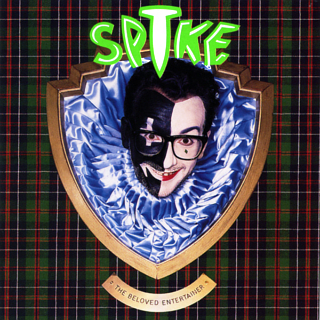Touching
onto the subject of neo-liberalism is an incredibly fascinating phenomenon in
our society. Not only does neo-liberalism ultimately usher in a completely new
way of political ideologies for superpowers in the West – (i.e. political
bedfellows Reagan and Thatcher) but neoliberalism appears in our popular
culture as well as a byproduct of the society and those who disseminate such
ideologies to us.
Consider
the 1989 album Spike by Elvis
Costello. Spike is often noted as
Costello’s most political album, though he had certainly made political
gestures on every album preceding it. Spike,
however, sets itself apart from previous albums and endeavors by providing a
Thatcher-era narrative towards the end of her tenure as prime minister. In
doing so, the scope of the Falklands War and the brutal near-destruction of
labor unions is amplified, and her actions are made that much more
revolutionary.
Certainly,
Costello has a cynical and critical go at Thatcher, his parents both belonging
to labor unions – his father was also a member of the Royal Orchestra – as well
as a strongly devoted English resident at heart. Spike was among one of the first, if not the first, politically
agenda-based records to do extremely well in the market, yielding a few singles
and music videos on MTV, which was relavatory at the time for a whole body of
work and popular music in the late 1980’s to fare so well.
Success can
certainly be deferred to Costello’s exemplary songwriting, but one has to think
that the working-class fans of the punk-rock rooted musician had some modicum
of an idea what Costello was talking about – namely Thatcher’s neo-liberalist
regime and the destructive practices she implemented into British society and
economy.
Costello’s
next album was much more tame, perhaps due to Thatcher’s leave of office, or
his collaborations with Paul McCartney, but it seems to me that a popular music
record has not paralleled so effortlessly what Costello did – that is,
interweaving political and cultural unrest for a generation into a superbly
made record that is often looked upon as one of his best.
Even the
cover of the album (below) depicts a duality in nature. The
blackface/vaudevillian Costello, happy to perform and provide escapism and the
white-face, ghoulish looking Elvis who is appalled at the current state of
nature in his country. Overall, Spike is one of the best albums by Costello, but also
one of the greatest musical treatises on neo-liberalism to date.
(http://upload.wikimedia.org/wikipedia/en/9/93/Elvis_Costello_Spike.jpg)

No comments:
Post a Comment